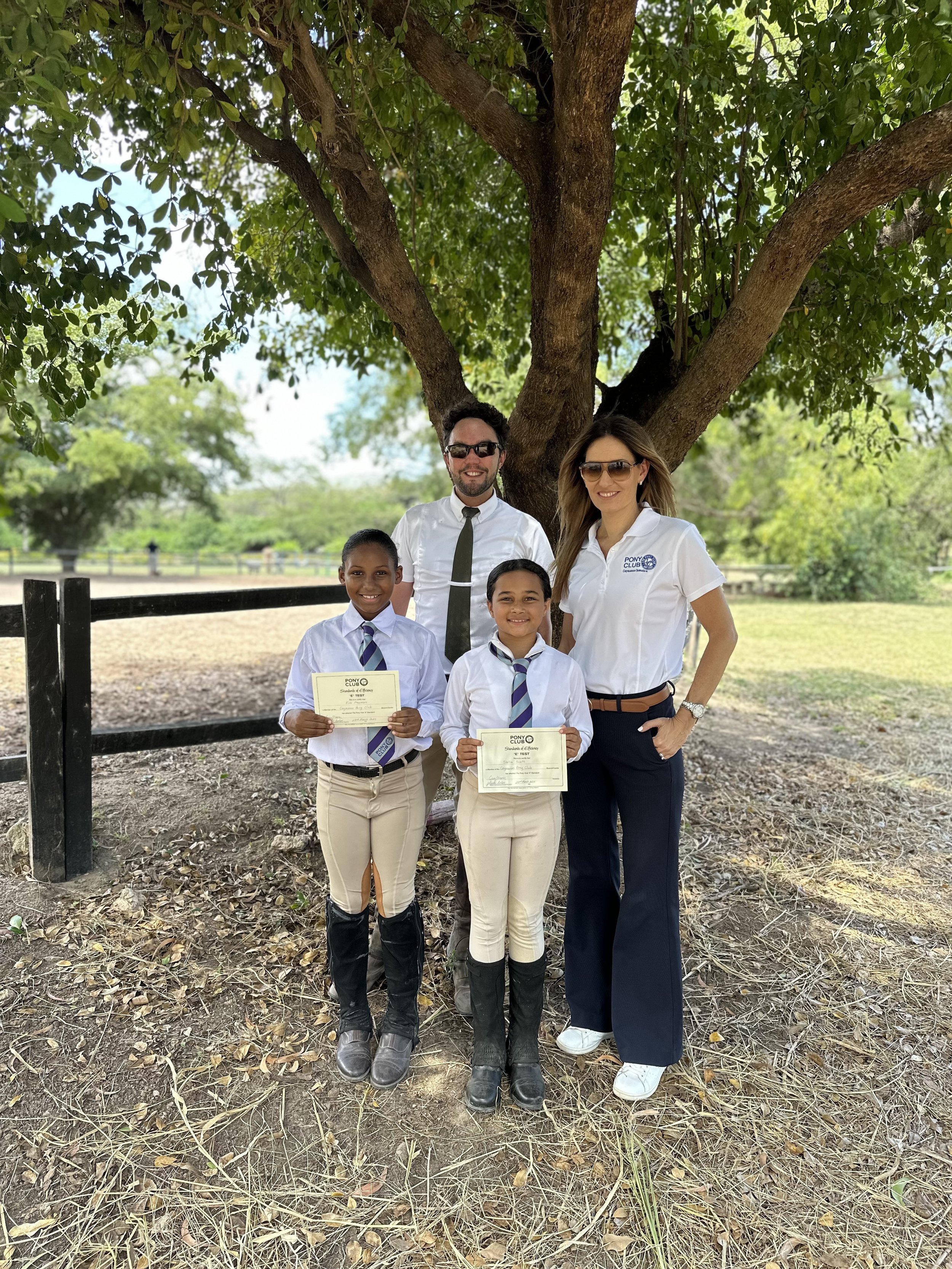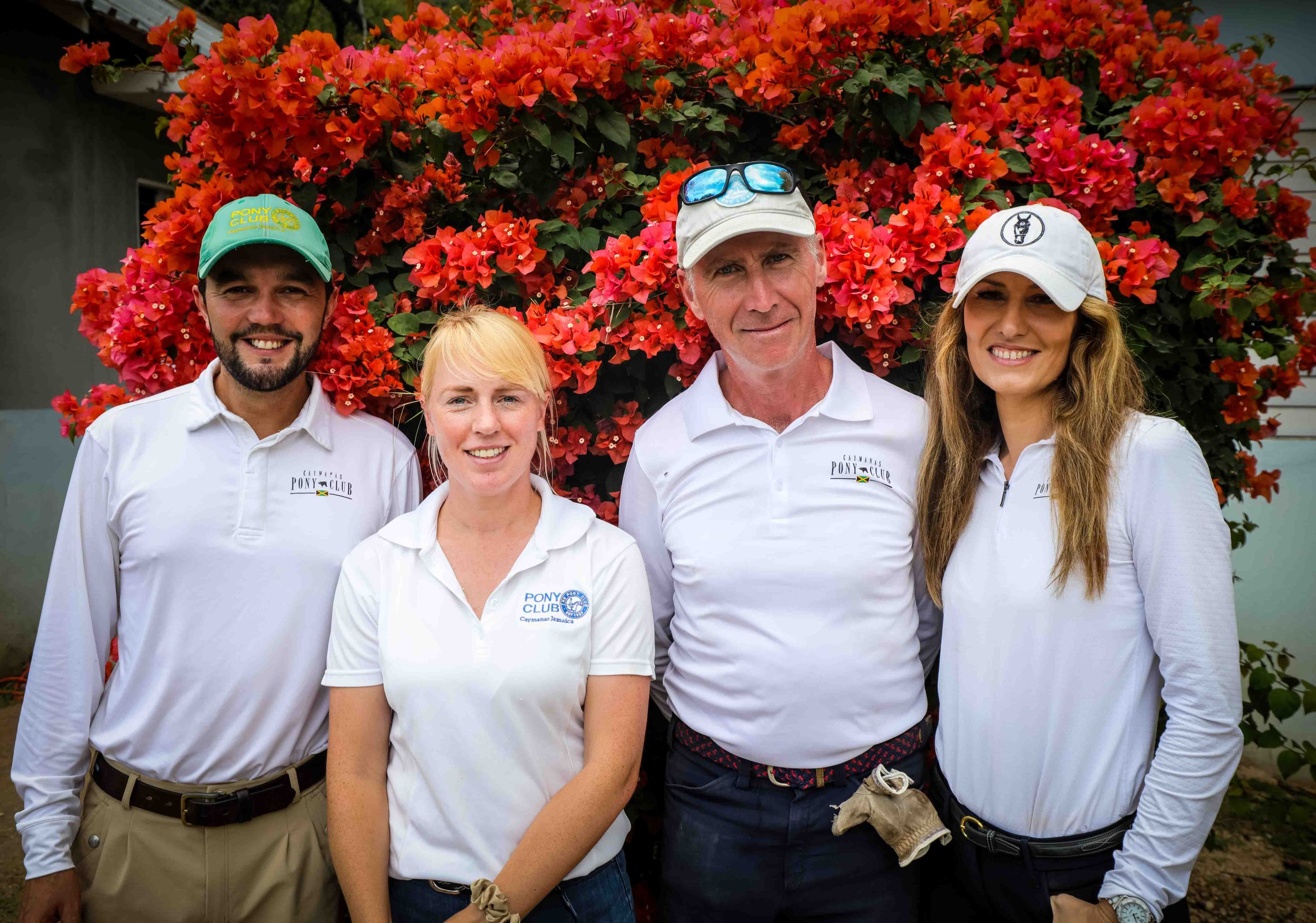Heidi Lalor Fosters Horsemanship at Caymanas Pony Club in Jamaica
Caymanas Pony Club trainers Heidi Lalor (right) and Guy Moore smile with students following Pony Club examinations. PHOTOS COURTESY OF HEIDI LALOR
Caymanas Pony Club Director Heidi Lalor couldn’t be more proud of her students, who finished taking their Pony Club exams at the end of March. They’ve proven their horsemanship both in and out of the saddle, a testament to the program Heidi has spent 14 years developing in Kingston, Jamaica.
“When you have that Pony Club badge, it means a great deal to the equestrian community, and for Jamaica as a linked center, it's an international stamp of approval,” said Heidi, president of the Equestrian Federation of Jamaica and a JustWorld supporter. “It’s a sign of education, not just, ‘I ride at a standard.’ It’s also, ‘I understand horse care at a standard.’ It’s a very prestigious logo, and it’s up to me to continue promoting it.”
Caymanas Pony Club is one of over 600 Pony Clubs affiliated with the British Pony Club, with members in at least 27 countries. Founded in 1929, the British Pony Club teaches the art of horsemanship and riding across nine disciplines to riders ages 5 to 25.
“We’re very structured in the syllabus; it matches global Pony Club programs,” Heidi said. “We don’t have the fancy facility; we don’t have the fancy horses, but we do have the instruction and the care, which is so important.”
Riding in paradise
Though Caymanas Pony Club may share the same syllabus as other Clubs, its access to Jamaica’s rich culture and scenery makes the program unique. From riding on the beach to arenas backdropped by hills and mountains, the students in Jamaica have done it all.
“When we completed our beach riding badge at Half Moon Equestrian Center (Montego Bay), the photos were quite spectacular,” Heidi said. “The UK Pony Club shared our photos online, and we certainly got a lot of attention and comments like, ‘Wow, look at that. It’s Pony Club in paradise.’ ”
Caymanas Pony Club takes the beach!
Caymanas Pony Club can also tweak the achievement badges to incorporate Jamaican culture. An example is the farming badge the students earned at Trade Winds Citrus Ltd., Jamaica’s largest citrus farm.
“We incorporated outriding on a citrus farm as an educational farming badge for the kids so that their experience was special and fun,” Heidi said. “We were creative and customized our Pony Club activities to include badges, which has been very successful.”
Reviving English Sport
Heidi was born and raised in Trinidad and Tobago, where she grew up in a cricketing family. Her grandfather, Jeffrey Stollmeyer, was a former captain of “The Windies” West Indies men’s cricket team. He was also a passionate horse racing fan, the owner of several racehorses, and the inspiration for Heidi’s love of horses.
“In Trinidad, we had the racetrack right in the center of town,” Heidi said. “My first exposure would’ve been around the savannah, where the horse racing was. The savannah is a public space, so if you’re driving around on the weekend, you’d see the horses racing. It’s always easy to tailgate at the race track and fly kites, kick a football, or play cricket.”
Heidi gained exposure to show jumping, dressage, and cross country through her aunt Patrice Stollmeyer, President of the Trinidad and Tobago Equestrian Association. As a competitor on the Caribbean Equestrian Association (CEA) regional circuit, Heidi was 13 when she attended one of her first competitions at Danny & Yvonne Melville’s Chukka Cove Polo and Equestrian Center in Ocho Rios, Jamaica, in the early 90s.
“I fell in love with Jamaica, and I enjoyed their equestrian scene,” Heidi said. “They had a large number of horses and riders, and it was very vibrant and exciting. They had polo, and Trinidad didn’t have polo. And, of course, you had the British royalty visiting Jamaica to play polo. [In Jamaica], there was dressage, cross country, jumping, and polo, and you could swim with the horses in the ocean all in the same day! I was 13 years old and very impressed!”
Dressage is one of the many disciplines taught at the Caymanas Pony Club. Photo Courtesy of Heidi Lalor
Jamaica’s English equestrian scene is experiencing a revival thanks partly to the FEI Solidarity’s FEI Eventing World Challenge Series, held at the Kingston Polo Club in November 2023. The Challenge, launched at the 2022 FEI General Assembly in Cape Town, South Africa, is an extension of FEI Solidarity, which develops and promotes equestrian culture and sport globally.
“I’m really proud of last year because we worked hard, were goal-oriented, target-trained, and we ended up with positive results. This is what the FEI said,” Heidi said. “We executed their vision, and Denise Cole-Avril [won] the derby locally and placed third overall in the world ranking, which was excellent.”
Run as a Category C Derby, the event saw 18 participants and is part of the FEI’s effort to revive eventing in Jamaica. The discipline died down in the 90s when equine piroplasmosis, a blood-borne disease, prevented the Jamaican eventing team from bringing horses to the 1991 Pan American Games in Atlanta, Georgia.
“It’s nice to be one of the few countries to be the first test pilot for an eventing challenge for the developing countries,” Heidi said. “[The FEI is] aiming at introducing eventing to younger kids, or a more amateur level, so they created a lower height derby which could be ridden on a polo field. I thought, ‘Well, we could do this. We have polo fields, polo ponies, ex-racehorses, and pony club ponies who could compete.”
Teamwork makes the dream work for Caymanas Pony Club trainers Guy Moore (from left), Lauren Kilgallon-Richards, Paolo Piccirillo, and Heidi Lalor. Photo by Bogdan Simandan
Pony Club Benefits
After attending the Fashion Institute of Design & Merchandising in Los Angeles, California, Heidi returned to Trinidad in 2012. She founded a riding school for children at Goodwin Heights Stables before moving to Jamaica in 2005, where she coached at Kingston Polo Club until 2009.
Upon visiting Trinidad and Tobago in 2010, Heidi learned that her old riding school had become affiliated with the British Pony Club. She sought to do the same in Jamaica with the help of Guy Moore, a British Horse Society-accredited Pony Club coach.
“There was a history of the Pony Club in Jamaica before me,” Heidi said. “At the time, there was a British lady named Tina Williams who was running a Pony Club program and migrating. Tina kindly passed on various badges and certificates, which assisted our transition to becoming a linked center.”
Today, Caymanas Pony Club has trained over 70 Pony Club members. They currently have 17 riders and numerous horses and ponies, which contrasts the one-horse program Heidi started with.
“The first polo pony we started with was an imported quarter horse,” Heidi said. “He was sturdy, steady, and very calm-minded, so that’s been the type we look for. Many assessments take place because, of course, in Pony Club, safety is the priority.”
Horsemanship is a priority for the students at Caymanas Polo Club in Kingston, Jamaica. Photo by Bogdan Simandan
In an age where equestrian sport has garnered more scrutiny from mainstream media, Heidi knows the unquestionable value of Pony Club.
“In this sport, horse welfare is paramount,” Heidi said. “The Pony Club’s ethos of instilling ethical and fair treatment of horses is a perfect route for young riders to begin their introduction to the sport and grow into well-rounded equestrians. Based on where the sport is now, the Pony Club remains extremely relevant to the future of the sport. I feel that we are also being judged on our horsemanship, and it’s very important not to skip the horsemanship and put the time in. I believe that the Pony Club badge says significantly more than people recognize.”
To stay updated on developments within the sport, Heidi traveled to the November 2023 FEI General Assembly in Mexico City. There, she met JustWorld Founder Jessica Newman and signed up for the newsletter. In support of the JustWorld cause, Heidi made a donation from the Caymanas Pony Club this February.
“Sometimes I get asked, ‘Do you really have Pony Club in Jamaica? Is it really Pony Club?’ And I’m like, ‘Yes, it’s British Pony Club,’ ” Heidi said. “I've heard programs are often full in England. Or, you may need to own a horse, or you’re waitlisted for a few months until you have a pony. In general, people I've spoken with are impressed that Pony Club is accessible in Kingston, Jamaica. More importantly, [that it’s] an accredited system which certifies members in riding and horsemanship while promoting welfare to future generations.”






